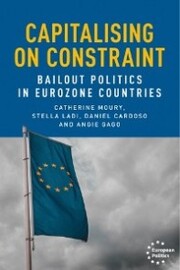Detailansicht
Capitalising on constraint
eBook - Bailout politics in Eurozone countries, European Politics
Moury, Catherine/Ladi, Stella/Cardoso, Daniel et al
ISBN/EAN: 9781526149879
Umbreit-Nr.: 2967308
Sprache:
Englisch
Umfang: 216 S.
Format in cm:
Einband:
Keine Angabe
Erschienen am 12.10.2021
Auflage: 1/2021
E-Book
Format: EPUB
DRM: Adobe DRM
- Zusatztext
- <p>This book is an essential analysis of what really happens behind closed doors during and after a bailout.<br><br>In the last decade, five Eurozone governments in economic difficulty received assistance from international lenders on the condition that certain policies specified in the Memoranda of Understanding were implemented. How did negotiations take place in this context? What room for manoeuvre did the governments of these countries have? After conditionality, to what extent were governments willing and able to roll back changes imposed on them by the international lenders?<br><br>This book explores the constraints on national executives in the five bailed out countries of the Eurozone during and beyond the crisis, from 2008 to 2019. The authors argue that despite international market pressure and creditors conditionality, governments had some room for manoeuvre during a bailout and were able to advocate, resist, shape or roll back some of the policies demanded by external actors. Under certain circumstances, domestic actors were also able to exploit the constraint of conditionality to their own advantage.<br><br><i>Capitalising on constraint</i> shows that after a bailout programme, governments could use their discretion to revert the measures that brought the greatest benefits at a lower cost. The authors provide a valuable insight into the determinants of bargaining leverage, the importance of credibility, and the limits of conditionality that might inform the design of international and European lending during future crises.</p>
- Kurztext
- This book explores the constraints on national executives in the five bailed out countries of the Eurozone - namely Greece, Cyprus, Ireland, Portugal and Spain. It also sheds light on the policy-makers discretion and motivations to revert, or alternatively to keep, policies that had been taken under conditionality.
- Autorenportrait
- <p>Catherine Moury, Faculty of Social and Human Sciences, NOVA University, Lisbon<br><br>Stella Ladi, Stella Ladi, Queen Mary University of London and Panteion University, Athens<br><br>Daniel Cardoso, Autonomous University of Lisbon<br><br>Angie Gago, University of Lausanne</p>
